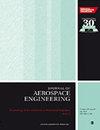Mechanism of characteristic change of panel flutter caused by oblique shock impingement
IF 1
4区 工程技术
Q3 ENGINEERING, AEROSPACE
Proceedings of the Institution of Mechanical Engineers Part G-Journal of Aerospace Engineering
Pub Date : 2023-08-18
DOI:10.1177/09544100231195377
引用次数: 0
Abstract
Compared to the shock-free condition, the weak shock impingement stabilizes the flexible panel, while the strong shock impingement leads to the early onset of panel flutter with a significant increase in flutter amplitude and frequency. However, the reason for this change by shock impingement remains unclear. The current research examines the mechanism of this change by an in-house code where the von Kármán’s large deflection plate theory is coupled with two-dimensional Euler equations. Compared to the shock-free condition, the oblique shock impingement leads to the change of local dynamic pressure on the panel as well as the static pressure differential across the panel. The analysis on the influence of these changes indicates that, on the one hand, the average dynamic pressure on the panel becomes larger than the shock-free condition, accelerating the onset of panel flutter. On the other hand, the change of the static pressure differential across the panel alters the coupling characteristic between different natural frequencies (modes) of the panel structure. The dynamic response of panel flutter under shock impingements is dominated by the coupling between the second and third modes instead of the first two modes for panel flutter under the shock-free condition. The combined effect of these two changes leads to the change of flutter characteristics of the panel under shock impingement. These findings provide valuable insights into the mechanism of shock-induced panel flutter.斜冲击引起板颤振特性变化的机理
与无冲击相比,弱冲击使柔性板稳定,强冲击使柔性板颤振发生时间提前,颤振幅度和频率显著增加。然而,这种由冲击引起的变化的原因尚不清楚。目前的研究通过内部代码检查这种变化的机制,其中von Kármán的大挠度板理论与二维欧拉方程耦合。与无冲击相比,斜冲击会导致面板上局部动压的变化,以及面板上静压差的变化。对这些变化的影响分析表明,一方面,面板上的平均动压力大于无冲击状态,加速了面板颤振的发生;另一方面,面板静压差的变化改变了面板结构不同固有频率(模态)之间的耦合特性。在无冲击条件下,面板颤振的动力响应主要由第二模态和第三模态的耦合主导,而不是前两模态的耦合。这两种变化的共同作用导致了冲击作用下板的颤振特性的变化。这些发现为研究冲击诱发板颤振的机理提供了有价值的见解。
本文章由计算机程序翻译,如有差异,请以英文原文为准。
求助全文
约1分钟内获得全文
求助全文
来源期刊

CiteScore
2.40
自引率
18.20%
发文量
212
审稿时长
5.7 months
期刊介绍:
The Journal of Aerospace Engineering is dedicated to the publication of high quality research in all branches of applied sciences and technology dealing with aircraft and spacecraft, and their support systems. "Our authorship is truly international and all efforts are made to ensure that each paper is presented in the best possible way and reaches a wide audience.
"The Editorial Board is composed of recognized experts representing the technical communities of fifteen countries. The Board Members work in close cooperation with the editors, reviewers, and authors to achieve a consistent standard of well written and presented papers."Professor Rodrigo Martinez-Val, Universidad Politécnica de Madrid, Spain
This journal is a member of the Committee on Publication Ethics (COPE).
 求助内容:
求助内容: 应助结果提醒方式:
应助结果提醒方式:


